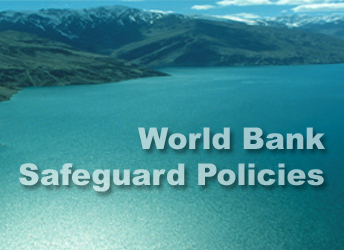World Bank’s Safeguard Policies Review

In July 2012, the World Bank began a process to review its environmental and social safeguard policies pertaining to development projects that the organization funds. This process, which is estimated to take two years to complete, is comprised of three phases. The first phase is currently underway, and thus far has resulted in the release of an approach paper detailing the rationale for the review and the process of the reviews and consultations (the updated document, as of 22 December 2012, can be found here).
The World Bank adopted its first involuntary resettlement policy in 1980 and, despite this policy, countless people have suffered displacement and inhumane treatment from Bank-led projects. From the approach paper it is clear that the Bank understands that the current policies are not sufficient and do not fully protect affected communities and populations. The review document states that:
“As part of the review and update process, the Bank will consider if and how it could potentially address a number of emerging areas that are not covered by the current safeguard policies. These include climate change; disability; free, prior and informed consent of indigenous people; gender; human rights; labor and occupational health and safety; and land tenure and natural resources.”
Despite this initiative, many fear that the real motivation behind the review is to weaken the safeguards, in order to remain competitive with other lenders who do not have these policies. With this concern in mind, members of civil society have joined together under the initiative of Inclusive Development, to create a initial list that highlights ways in which the current safeguards can be improved, and also urge the World Bank to adhere to the following basic principles:
- No Dilution of the current safeguards: the safeguard review must not lead to any dilution of existing safeguards but instead result in stronger protections for people and the environment.
- Upward harmonization: At a minimum, the World Bank safeguards should be consistent with international laws protecting human rights and the environment, avoiding a potential “race to the bottom.” Current policies do not ensure respect for labor rights, women’s rights, children’s rights, rights of people with disabilities, and land rights.
- Closing the loopholes: The current policies apply to a shrinking number of Bank activities. Safeguards should apply to all types of Bank-supported activities, including, for instance, policy loans and technical advice to governments.
- Full implementation: The Bank should ensure that Bank staff has the incentives, capacity, and skills to ensure effective safeguard implementation.
- Accountability: Safeguard policies and procedures should be binding and sufficiently detailed to allow the Inspection Panel—the World Bank’s accountability mechanism—to review their implementation.
In order to ensure that the new policies do not diminish protections, it is imperative that civil society play a key role in the consultation process. HLRN also has pursued the principle that it is an international law-bound obligation of the World Bank specifically to respect, protect and fulfill housing rights, which currently is does not. This is often a key issue associated with many of the Bank’s development projects involving resettlement.
To stay updated on the locations and progress of consultations, visit the World Bank’s safeguards review website to get involved. HIC-HLRN will also be following this process closely and will provide periodic updates to Members and on its website.
|